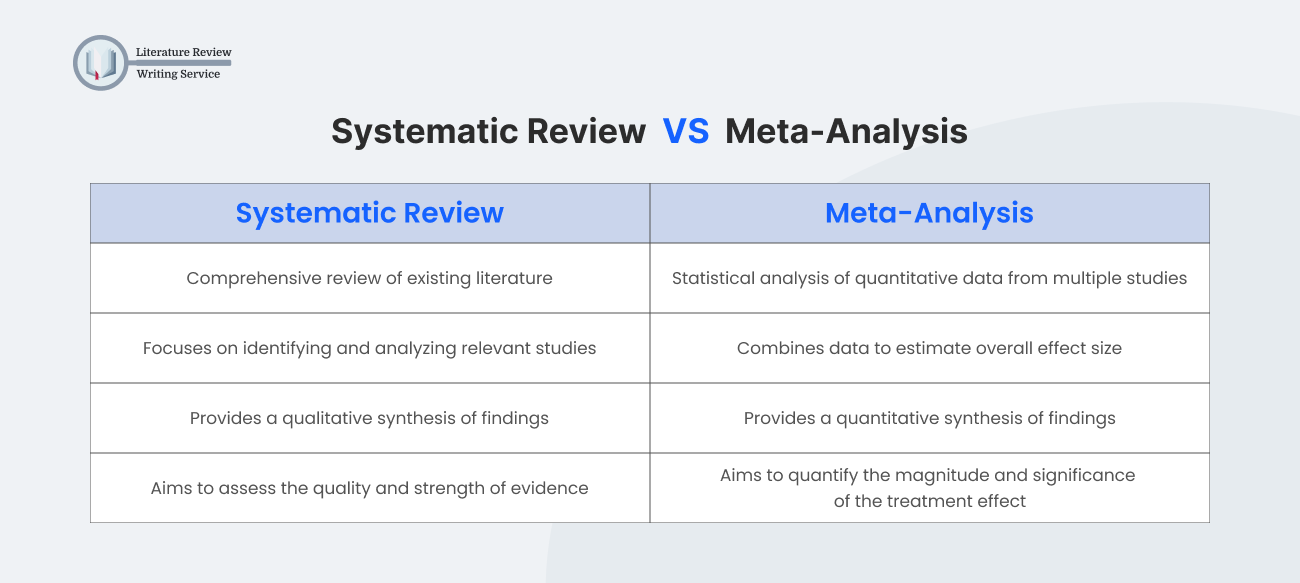
Meta Analysis vs Systematic Review: All the Help You Need in One Place
Take the most from professional help for your systematic review and meta analysis.
Our Guarantees for Your Systematic Review and Meta Analysis Projects








Our Comprehensive Approach to Writing a Meta Analysis

Customer Feedback on Our Meta Analysis Writing Services
Meet Our Best Meta Analysis and Systematic Review Writers

Meta Analysis vs Systematic Review: Let’s Come to an Understanding
Research is a daily and very effective tool for many specialists. Scientists, pharmacists, psychologists, doctors, marketers, and others use it daily in their work or study. Research questions may involve dozens of studies. But it cannot be a helpful tool without the right approach. This means that we must collect and analyze data from the scope of studies properly. And yes, there are stable methods for processing the information obtained from research. Most commonly, we have to choose meta analysis vs systematic review methods.
Basically, these are two systems to analyze and summarize research. In this article, we start the introduction to systematic review and meta-analysis by clarifying each method.
The Main Difference Between Systematic Review and Meta Analysis
What is the difference between meta analysis and systematic review? These academic works often gather and combine the evidence using meta-analysis. They are also commonly associated with an integrative paper that also involves synthesizing information. This is a method. However, this method is not a type of systematic overview, but it may be part of this.
Meta-analysis, in turn, uses statistical methods and formulas to integrate the results of the scope of studies. In this way, a researcher can compile data to a certain common denominator in one and quantify the effect.

Explanation One: What Is a Systematic Review?
There are simple words for what is a systematic review. This is a way of analyzing current knowledge about the issues addressed in your research. For such assignments, you need to collect information from all available sources, assess them, and synthesize the data using a research protocol. It is an excellent way to get a complete overview of a topic and find the answers to specific research questions. In more scientific terms, a systematic review gives a full and objective evaluation of what currently exists in your science.
A systematic review has five pillars that are the foundation for writing a good paper. Let’s go through them.
- Research question and objective. A systematic review begins with defining the research question or objective. This question should be clear and direct, related to what interests you.
- Search strategy. For a systematic review, you should use different sources, such as databases, academic journals, conference materials, and others. These sources can include both published works and those that haven’t been published yet.
- Selection of studies. The next pillar is to evaluate the quality of research and exclude those that do not fit the given selection criteria.
- Data analysis. The researcher needs to gather the results using different methods of meta analysis.
- Conclusions. This is the last step, where the researcher makes conclusions based on what they found in the research and clearly states them.
These components are significant, and applying them is essential. Without them, your meta analysis and systematic review will be incomplete and inaccurate.
Explanation Two: What Is Meta Analysis?
Meta-analysis is a way to combine the results from the scope of studies on the same topic and see what they say in the language of numbers. The answer to “What is meta analysis?” is that it’s a math method to combine the results from different studies about the same thing or question.
Meta-analysis helps to mix data from different studies and do math to find the answers. This method makes it easier to get more accurate and fair answers and to see how much we can trust the results. Meta-analysis also helps find common ideas, check the effects of what we’re studying, and see the differences between studies.
Using meta-analysis methods allows researchers to get a more accurate and complete picture. Generally, the process of writing a meta analysis assignment consists of five steps.
- Find research. Search for studies on your topic in libraries and online. Choose the ones that are easy to find and relate to your work.
- Gather the needed data. Take the important information from the studies, like results and numbers.
- Analyze data. Use math to compare and compile the results from different studies.
- Check that things match. Evaluate if the results of the studies you looked at are similar. You can do this without using complicated calculations.
- Make conclusions and write a paper. Make a clear summary of what you found in your research. Write down all the details in the report.
In choosing systematic review vs meta analysis, it’s obvious that a meta-analysis is one of the systematic review steps. It can be its part or not. On the other hand, a systematic review may be created based on a meta-analysis.
Summing Up the Difference Between Meta Analysis and Systematic Review
To summarize and clearly understand the difference between systematic review and meta analysis, let’s look at them through 3 characteristics.
Goal
- Meta-analysis combines the results of the scope of studies and gets a single overall estimate.
- A systematic review summarizes what’s known about a topic, finds research gaps, and suggests what should be studied next.
Statistical methods
- Meta-analysis combines the results of multiple studies using statistical methods.
- Systematic review does not necessarily use statistical methods.
Scope
- Meta-analysis typically focuses on a specific question or hypothesis.
- Systematic review typically covers a broader range of topics related to a particular issue.
What Will You Choose: Fight Alone or Ask For Help?
You may need meta analysis and systematic review at any stage of your studies or scientific activity. However, one person may find it hard to conduct studies, analyze, and organize the data. So be prepared that this requires a group of researchers. If you have someone to share this duty, this is great, but what if not?
That’s why our meta analysis writing services are here! Turn to our literary analysis essay writer anytime when you feel pressure, have no time, or just need a partner for research. Besides helping with systematic writing, we can offer comprehensive support for your investigations and meta analysis of your data. A pool of our proficient academics can take over most of your hassles. Just pick up one who suits your needs the best.




















